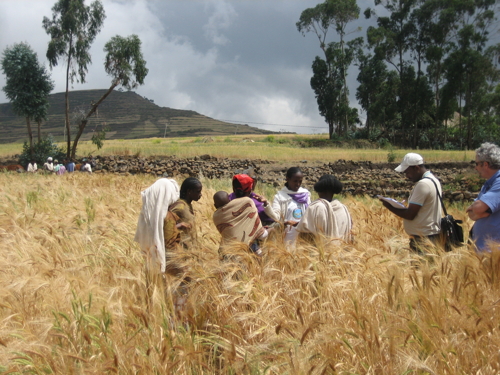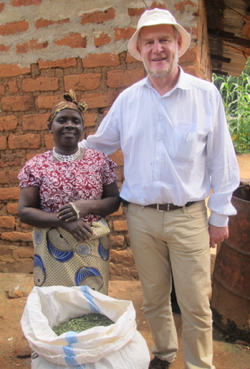Farming First is pleased to act as media partner for the Louis Malassis International Scientific Prize and the inaugural Olam Prize for Innovation in Food Security. Our new blog series will showcase stories from scientists nominated for these prestigious prizes.
The second blog in this series outlines the work of Dr. Emile Frison, nominated for the Louis Malassis International Scientific Prize for Outstanding Career in Agriculture.
Deploying agricultural biodiversity for sustainable food systems
Our food systems must be made more sustainable from an economic, environmental, nutritional and socio-cultural point of view. Land degradation undermines future productivity on millions of hectares. Ecosystem services are being weakened by inadequate farming practices. Decreasing diversity in production systems is accompanied by the loss of traditional knowledge and cultural identity. In addition, one third of the food produced is lost after harvest or wasted.
Throughout his tenure as Director-General of Bioversity International, Dr. Emile Frison devised a new strategy for addressing these problems, by promoting a greater and wiser use of agricultural biodiversity. This work demonstrated that more diverse production systems can improve the livelihoods and the quality of nutrition of smallholder farming communities and improve the resilience, stability and the environmental sustainability of their farming systems. Diversity is particularly important for poor smallholder farmers who cannot afford the risk of one shock, such as a pest or drought, to destroy his or her entire crop.
“Implementing this strategy was challenging, as most funding sources still focus on single objectives such as raising productivity, addressing single nutrient deficiencies or drought resistance,” comments Dr. Frison. “However, there are many examples of successful projects, implemented by Bioversity and its partners, that address more than one single objective.”
Back to basics: traditional leafy vegetables in Kenya
In Kenya, traditional green leafy vegetables such as amaranth and nightshade, were not considered by local farmers as a food that should be grown, eaten and sold. Through a project led by Bioversity, farmers were educated on the nutritional benefits of these indigenous plants. Re-introducing these diverse crops to the market has been successful at increasing the income of smallholder, mainly women farmers, and also improving the stability and resilience of their production system, as farmers were no longer reliant on a few crops. This now involves over 100,000 small farmers and has been expanded to 11 other countries.
Seeds4Needs: Coping with Climate Change
Certain seed varieties will be more resilient to the harsher climate conditions farmers in the developing world are being faced with. Bioversity International’s initiative works with farmers to research how agricultural biodiversity can help minimize the risks associated with climate change. Through a crowd sourcing approach, farmers are allowed to select seed varieties that best suit their unique and specific needs. This initiative has been welcomed by tens of thousands of farmers in Northern India and in five other countries.

Farmers evaluate seed varieties in the field.
Ensuring the conservation and the continued access to plant diversity is another dimension of Bioversity and Dr. Frison’s work. It contributed to developing the concept of a multilateral system of access and benefit sharing which is the basis of the International Treaty on Plant Genetic Resources for Food and Agriculture and organized multi-stakeholder dialogues to improve its functioning.
“But production is only one side of the issue” comments Dr. Frison. “In fact, the problems mentioned above are intertwined and therefore they must be addressed in an integrated, multi-sectorial, multi-stakeholder and multidisciplinary fashion. Only this approach will allow us to find comprehensive and durable solutions and move towards sustainable food systems.”
“This is why in the last few years, I have been engaged in fostering approaches that aim at breaking down the barriers between the silos in which these issues have been confined. This means encouraging the active involvement of all stakeholders and the collaboration between different ministries at the national level and between different International Organizations at the global level.”
Initiatives that seek to do this, such as the Landscapes for People, Food and Nature initiative and the International Panel of Experts on Sustainable Food Systems, need to be considerably strengthened, according to Dr. Frison
“Farmers and their organizations have a key role to play and must be given a greater voice in rethinking our food systems in a way that will not only address the challenges of today, but will ensure that our children and their children will be able to live fulfilling lives”.
The winners of the Louis Malassis International Scientific Prize and Olam Prize for Innovation in Food Security, will be announced at the Third Global Science Conference on Climate Smart Agriculture on 16th March, 2015.




